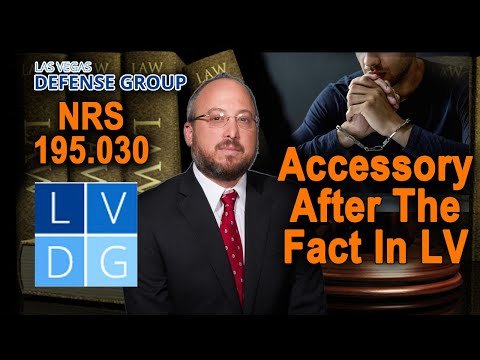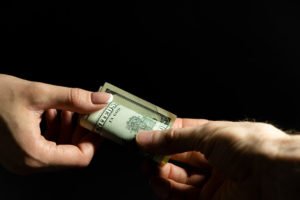
Nevada defines being an accessory after the fact as knowingly and intentionally assisting someone in evading arrest or punishment after they have committed a crime. While you might not have been involved in the actual crime, aiding or hiding the perpetrator in its aftermath is its own criminal offense.
Under Nevada law, acting as an accessory to a felony is prosecuted as a category C felony carrying 1 to 5 years in prison and up to $10,000. Meanwhile, acting as an accessory to a gross misdemeanor is prosecuted as a misdemeanor carrying 30 days to 6 months in jail and/or $100 to $500.
In this article, our Las Vegas criminal defense attorneys discuss:
- 1. What is an accessory after the fact?
- 2. How is it different from aiding and abetting?
- 3. How can I fight the charges?
- 4. What are the penalties?
- 5. Related offenses
1. What is an accessory after the fact?
Whereas a principal carries out — or helps to carry out — the commission of a crime,1 an accessory is someone who:
- harbors or aids a principal after they committed a felony or a gross misdemeanor, and
- intends to help the principal avoid arrest, trial, conviction, or punishment for the crime.
In short, accessories assists principals with the aim of keeping principals from being prosecuted or sentenced for a past criminal offense.
Example: Harry buys several bags of cocaine in North Las Vegas. Paranoid that someone may find it and report him, he asks his neighbor John to help him bury the coke behind Harry’s house. If caught, both Harry and John could be booked at the North Las Vegas Detention Center. Harry would then be charged with drug possession, and John would be charged as an accessory for helping Harry conceal evidence of his crime.
If John helped Harry buy the coke, John would instead be charged with drug possession. Though because John did not enter the picture until Harry finished the drug sale, he is just an accessory after the fact. Other examples of acting as an accessory are:
- concealing the perpetrator of a crime
- destroying evidence of a crime (such as trashing a knife or cleaning blood from a crime scene)
- helping a fugitive flee
- lying to police to help the perpetrator avoid arrest
Note that you cannot be charged as an accessory under Nevada law if you are related to the suspected principal as a spouse, sibling, parent, grandparent, child, or grandchild.2

Knowingly hiding a fugitive so police cannot find them is acting as an accessory.
2. How is it different from aiding and abetting?
The difference between being an accessory and aiding and abetting is timing. Helping a criminal carry out a crime before the criminal activity has ended is aiding and abetting. Helping an alleged criminal after the criminal activity has ended is being an accessory.3
Example: Bob goes into a convenience store in Henderson and holds up the cashier. His friend Fred, who is in the store at the time, decides to help Bob by taking the cash from the cash register. After Fred and Bob escape with the money, they flee to the house of their friend Andy, whom they then inform about the robbery. Andy then offers to hide the loot.
If caught, Bob, Fred, and Andy could all be booked at the Henderson Detention Center. Bob would be charged with robbery. Since Fred aided Bob during the hold-up, he would be charged with robbery as well. Since Andy helped Bob and Fred after the robbery had ended, Andy would just be charged with being an accessory under Nevada state law.
Note that being an accessory is also distinct from being a conspirator. The legal definition of a conspiracy is when two or more people make an agreement to commit a crime. Meanwhile, you may act as an accessory without making an agreement with anyone.4
3. How can I fight the charges?
Here at Las Vegas Defense Group, we have represented countless people accused of acting as an accessory after the fact. In our experience, three defenses that have proven effective with prosecutors, judges, and juries are:
- You were not aware of the principal’s crime. Helping or concealing a criminal is not a crime unless you were aware at the time that you were helping or concealing a criminal. If the D.A. cannot prove that you knew that you were aiding someone from escaping prosecution, the criminal case should be dropped.
- You were just a bystander. It is not illegal to witness or learn of a crime and then do nothing about it unless you have a legal duty to report it (such as a physician suspecting a child is a victim of abuse). As long as you took no affirmative steps to help the alleged criminal get away with the crime, there is no accessory liability.
- You acted under duress. If you are threatened with imminent or serious harm if you refuse to harbor a criminal, you are not liable as an accessory. If we can show that you were under duress when you helped the criminal, the case should be dropped.5
Other typical defenses to accessory charges include that you were falsely accused or that you were a victim of mistaken identity. In any case, the prosecution has the burden to prove guilt beyond a reasonable doubt in order to sustain a conviction.
4. What are the penalties?
The Nevada punishment for acting as an accessory after the fact depends on whether you were allegedly an accessory to a felony or a gross misdemeanor.
Acting as an accessory to a felony is usually prosecuted as a category C felony, carrying a sentence of:
- 1 to 5 years in Nevada State Prison, and
- up to $10,000 in fines (at the court’s discretion)
Meanwhile, acting as an accessory to a gross misdemeanor is usually prosecuted as a misdemeanor, carrying a sentence of:
- 30 days to 6 months in county jail, and/or
- $100 to $500 in fines (at the court’s discretion)6
Note that immigrants convicted of being an accessory may face deportation depending on the case.

Knowingly giving money or aid to a fugitive is acting as an accessory.
5. Related offenses
Acting as an accessory may involve lying to the police. Consequently, a suspected accessory may face such additional charges as the following:
- Offering false evidence (NRS 199.210) – a misdemeanor carrying up to 6 months in jail and/or $1,000 in fines.
- Resisting arrest (NRS 199.280) – a misdemeanor carrying up to 6 months in jail and/or $1,000 in fines.
- Obstructing a police officer (NRS 197.190) – a category D felony carrying a prison sentence of 1 to 4 years and possibly up to $5,000.
We see accessory charges most often in cases involving the following crimes:
- Kidnapping (200.310) – taking and moving a person without their consent
- Felony murder (NRS 200.030) – causing a homicide while carrying out a felony crime
- Bank robbery (18 USC 2113) – stealing from a bank
- Gang crimes (NRS 193.168) – committing a crime in furtherance of a gang
- Carjacking (NRS 205.228, 200.380 & 200.471) – stealing a car from a driver or passenger
In California? Learn about Penal Code 32 PC.
Legal References
- Nevada Revised Statute 195.020. See also State v. Plunkett, (2018) 429 P.3d 936, 134 Nev. Adv. Rep. 88; Desai v. State, (2017) 133 Nev. 339, 398 P.3d 889, 133 Nev. Adv. Rep. 48.
- NRS 195.030.
- NRS 195.020.
- NRS 199.480.
- .
- NRS 195.040.

